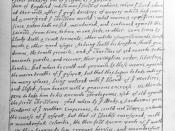The Puritan people first came to the New World to escape the religious persecution that hounded Non-Anglicans in England. They established the Plymouth Colony in 1620, in what is now Massachusetts. The colony was a reflection of the Puritans' beliefs. These beliefs, along with the experience of establishing a colony in 'the middle of nowhere', affected the writings of all who were involved with the colony. In this writing, the Puritan philosophy behind William Bradford's 'Of Plymouth Plantation' will be revealed. Some factors that will be considered include: how Puritan beliefs affect William Bradford's interpretation of events, the representation of Puritan theology in the above mentioned text, and how Puritanism forms the basis for Bradford's motivation in writing.
In Bradford's text, there are numerous instances in which his beliefs affect his interpretation of what happens. In Chapter IX (nine) of 'Of Plymouth Plantation', entitled 'Of Their Voyage...'
, he tells of a sailor '..of a lusty, able body..' who 'would always be condemning the poor people in their sickness and cursing them daily....he didn't let to tell them that he hoped to help cast half of them overboard before they came to their journey's end'. But, 'it pleased God before they came half-seas over, to smite this young man with a grievous disease, of which he died in a desperate manner, and so was himself the first that was thrown overboard'. Bradford believes that the sailor died because God was punishing him. According to Bradford, the sailor's cursing, and mistreatment of the other passengers displeased God, so God punished him accordingly.
In the same chapter, Bradford tells of another ship passenger named John Howland. At one point in the trip, the Mayflower came upon a violent storm. The winds of the storm were so fierce, and...



Really good
This essay really helps me understand the topic so now I accualy know what to write in my own essay for school thanks alot your essay really helped me alot.
2 out of 2 people found this comment useful.